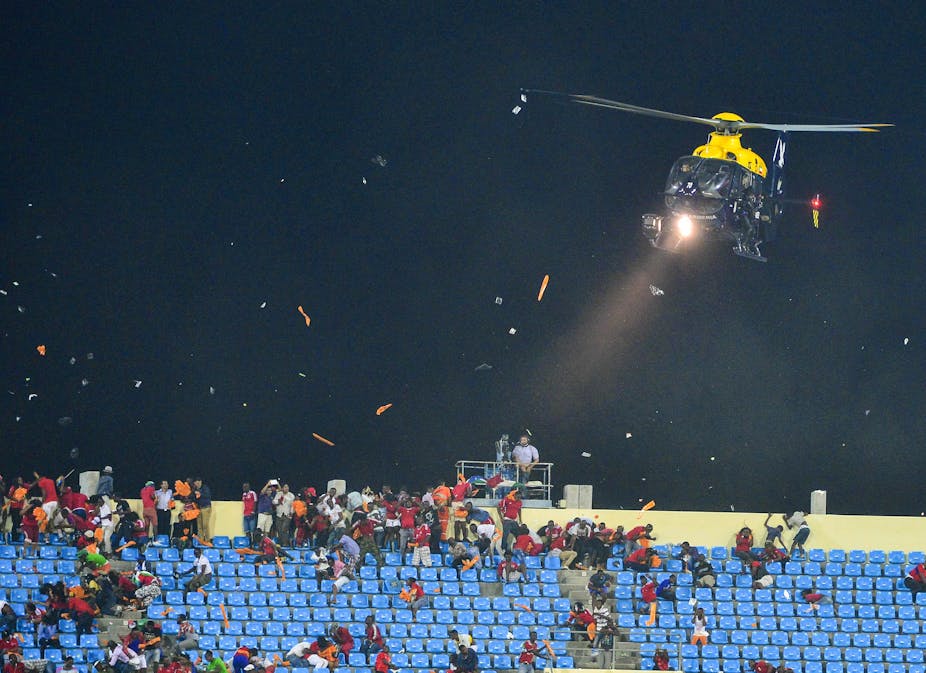Ghana and Côte d'Ivoire will meet in the final of the 2015 Africa Cup of Nations on February 8, bringing to a close a tournament that has had its fair share of both beauty and bile. Chaotic scenes during the semi-final between Ghana and hosts Equatorial Guinea saw Ghanaian fans fleeing onto the side of the pitch to escape missiles being thrown from home fans, angry that their side was losing. A helicopter flew low over the pitch to disperse the crowds, and the match was only able to resume half an hour later, resulting in a 3-0 win for Ghana.
But in the past three weeks, Equatorial Guinea has produced some football worthy of the tournament’s growing stature. Equatorial Guinea was only chosen as host by organisers the Confederation of African Football (CAF) as a last-minute replacement for Morocco, which withdrew citing fears over the Ebola outbreak.
Many of the matches have been very close and there have been some nail-biting games. In the first round, only one of the six games in group D produced a winner, the rest were evenly-matched 1-1 draws. This necessitated the dusting off of the rule book to decide whether Guinea or Mali moved through to the elimination stages. After drawing lots, Guinea progressed, leaving a heart-broken Mali team who exited the tournament unbeaten.
Tempers flared
While the games have been exciting, there were problems on the field. The tournament has been a tempestuous one, with wranglings, ugly scenes, and misbehaviour. The quarter-final game between the hosts and Tunisia ended in controversial circumstances in Bata, with a late penalty that forced the game into extra time.
At the end of the match, which resulted in a 2-1 victory for Equatorial Guinea, there were ugly scenes with Tunisian players harassing match officials. CAF took the decision to impose a US$50,000 fine on Tunisia with more to come if Tunisia fails to present a written apology for its actions. But it was also encouraging to see CAF de-list the game’s match official from an “A” grade rating and hand him a six-month ban for the gross incompetence that preceded the shocking scenes.
There was similar disruption in Ghana’s game against Guinea where Guinean players took out their frustrations on match officials with wild scenes and unruly behaviour. But CAF was silent.
The violence that ensued in the semi-final match, which the Ghana FA compared to a “war zone”, has cost Equatorial Guinea a £65,000 fine. Some players from the Democratic Republic of Congo expressed fears for their safety ahead of the third-place play-off match in the same stadium.
Unready, and unwanted protests
There were also problems beyond the pitch. The opening week featured complaints about the availability of hotel rooms and running water. Three people arrested for distributing or having posters protesting about the tournament are yet to be released, according to Amnesty. The reported imprisonment and beating of these people has not helped Equatorial Guinea dispel the loud concerns over its human rights record going into the tournament.
Similarly, pre-tournament concerns about the size of two stadia in Ebebiyin and Mongomo did prove to be an issue. When Equatorial Guinea reached the quarter-finals, the match against Tunisia was scheduled to be played in the 5,000-capacity Ebebiyin stadium. This immediately raised safety concerns as the host team attracts well over 30,000 fans to its games and it was clear that Ebebiyin was not large enough. Fortunately, the quarter final games were rescheduled to bigger stadia in Malabo and Bata.
The football will win out

The battle between the perennially favoured but often underachieving Ivorians, known as Les Éléphants, and the Ghanaian Black Stars, who last won the African championship in 1982 is a dream final. These are the two teams playing the best football in the tournament.
The Africa Cup of Nations has grown enormously since its inception in 1957, and with some of the world’s best footballers it now has a lucrative sponsorship profile.
There is now an expectation that each tournament will be hosted in pomp and pageantry worthy of its status. But CAF should open its doors wide for countries that have yet to host the competition. The confederation can do this by awarding joint hosting rights that help smaller countries develop sporting facilities. The Equatorial Guinea experience as joint hosts in 2012 was important in locating an emergency host in 2015. It is a lesson worth noting.

